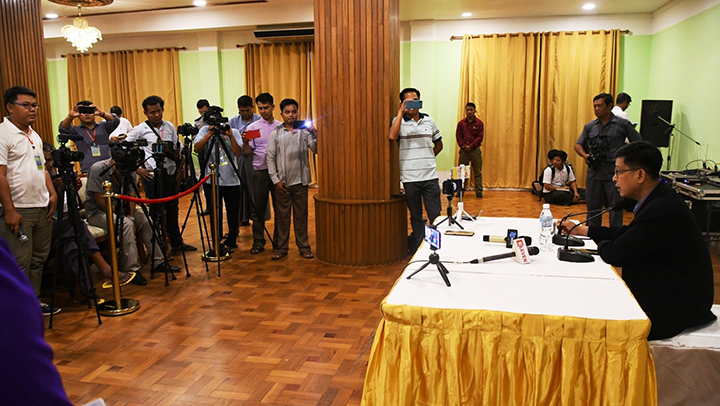Seven points were agreed between the government’s National Reconciliation and Peace Centre (NRPC) and four ethnic armed groups — KIO (Kachin Independence Organisation), MNTJP (Myanmar National Truth and Justice Party), PSLF (Palaung State Liberation Front), and ULA (United League of Arakan) during ceasefire negotiations yesterday in Kengtung, Shan State.
Following the meeting, the Director General of the Office of the State Counsellor, U Zaw Htay, who participated in the talks, held a press conference.
“Seven points were agreed during today’s talks. Roughly, both sides have agreed to sign the bilateral ceasefire agreement, and discuss ways for ending the current armed conflicts and tackling the internally displaced persons (IDP) issue. Besides, they have agreed to hold talks again with the Tatmadaw over designating ceasefire rules to be followed by both sides,” he said. He continued to say the two sides have also agreed establishing communication offices to avoid further clashes, no arrests from both sides for building mutual trust and a common plan for NCA, making acceptable dialogues from both sides for stronger ceasefire agreement, and another meeting in October 2019.
The government has planned to hold the NCA anniversary, and making discussion about resuming 21st Century Panglong. The UPDJC Secretarait will have an oversea trip. And that we will choose an appropriate timing for the next meeting amidst the above-mentioned schedules. In brief, we could made the seven agreements in this fourth peace dialogue.
We issued a joint statement after the previous meeting. As we could make some agreements through serious discussions, this dialogue has positive results. Through frequent meetings, it is hopeful that we have obtained mutual understanding, and the discussions were very friendly and frankly.
As both sides are genuinely trying for a halt of armed clashes in northern Shan State and the emergence of a lasting ceasefire agreement, it is very optimistic about getting better results in upcoming dialogue in near future.
When Director-General U Zaw Htay replied to the answers of media persons, he said that the government was ready to sign a bilateral agreement. If a representative of respective armed group did not have a mandate to do it when they came to the dialogue, they could go back to Mongla for getting approval from their headquarters while we would be waiting for them in Kengtung. However, the four northern armed group just agreed on the meeting minutes as their headquarters did not give them a mandate to sign bilateral agreement. These points are also some parts of bilateral agreement. If they received a clear mandate, it is hopeful to sign the agreement. Therefore, these representatives will report back to their headquarters, and agreed the developing points in the meeting minutes. A wide range of discussions resulted in broader agreements.
In replying to a question about discussion on reducing armed conflicts included in the Bilateral Ceasefire Agreement he told of requiring an agreement on ending armed conflict. Arrangements were made to cease firing on a certain date but the four northern groups were not ready to sign it so it was kept as an agreement reached at the meeting.
On the matter of monitoring committee included in the Bilateral Ceasefire Agreement U Zaw Htay said the latest agreement was on conflict resolution, how to resolve dispute between the two groups. It was not about monitoring. It was conflict resolution during the interim period like how to resolve dispute on deployment of forces said U Zaw Htay. On the question of whether there’ll be an extension of Tatmadaw’s ceasefire that will end on 21st September, he responded in a positive manner saying Tatmadaw representative group led by Lt-Gen Yar Pyae will be reporting to Commander-in-Chief of Defence Service.
With regards to preparation made by the government to prevent harms to the people if discussions didn’t go well he replied that peace could not be achieved by one side only. A will from all side was required, and said Tatmadaw representative group offered to discuss with the four northern groups individually and discuss what was needed by each group. But the other side didn’t have the mandate to do that. This side made efforts to avoid conflicts. Agreement to prevent conflict was required and this side made an effort toward that end. While having Tatmadaw representative group was present an approach was made for AA and TNLA to have a separate meeting with the Tatmadaw as the discussion would be effective and an offer was made, said U Zaw Htay.— MNA
(Translated by Zaw Min)


